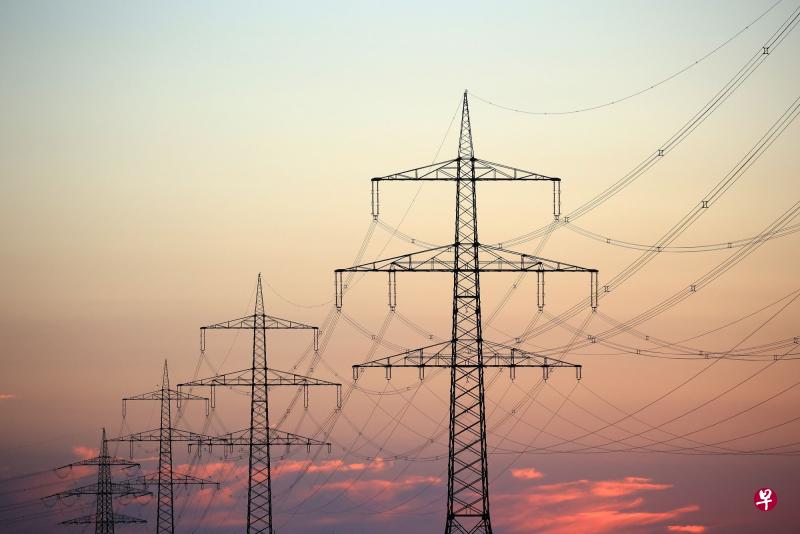
Extremely high -temperature weather has swept the northern hemisphere in the past two months, European countries are the first, heat waves, wildfires, droughts and other disastersFrequent.
The folk circulation, "the hotter summer, the colder the winter", , But meteorologists have speculated that the Lamana phenomenon in the past two years will continue until 2023, I am afraid it will be colder this winter.
Since Russia invaded Ukraine in February this year, Europe has implemented oil embargo on Russia, Russia has greatly reduced natural gas supply to Europe, Energy prices have repeatedly reached record highs.
The global inflation rate is high, Under high voltage shrouds such as geopolitics instability, European region, especially the United Kingdom, It will face more severe energy supply challenges, The next winter may be more difficult than summer.
In the 1970s, Britain faced the biggest economic crisis since World War II. The continued soaring energy price -driven dual -digit inflation rate, the economy fell into a recession.At that time, the power station relied on coal was unable to operate normally due to the strike of coal miners, and the power outage was frequent.
The conservative party government led by the British Prime Minister Henry announced in November 1973 that the state entered an emergency, restricting energy supply, and prohibiting stores, offices and restaurants heating.The government also shortens the work day of the government to a weekdays, restricts the driving speed of the car, and stipulates that people will close the TV before 10:30 pm.
The elderly British elderly in this dark period may think that the restrictions on crown diseases in the past two years are only pediatrics; but they can also realize that the crisis of the year may have begun to repeat in the UK.
According to data from the British National Bureau of Statistics, the British Consumer Price Index (CPI) rose 10.1 % year -on -year year -on -year, setting the highest record since 1982.The Bank of England predicts that CPIs may rise to 13 % from October.Nabaro, the chief Economist of Citi Group, also predicts that British inflation will reach 18.6 % of the peak in January 2023.
The rise in daily necessities such as energy, food and other daily necessities is the biggest factor to promote inflation. High living expenses have become one of the most worried issues in the current British, especially the increase in natural gas and electricity bills.Natural gas is Britain's largest power generation energy, accounting for more than 40 %.
In mid -2021, the British natural gas prices began to rise due to high global demand, gas field maintenance problems, solar energy and wind power output.After the outbreak of the Ukrainian war, the price climbed to a new high since 2008.Although Britain's dependence on Russia's natural gas is relatively low, the tension of regional supply means that Britain will inevitably be affected by price fluctuations.
Energy crisis exposes the high dependence of imported power in the UK
In order to achieve the target of net zero emissions, avoid carbon tax, and solve the limited natural gas storage problem, Britain has also increased imports from neighboring countries in the past few years.However, Britain's main imports of Electricity Norway and France have had to limit the power export of power due to the sharp decline in production this year.
In the face of the "perfect storm" of the energy crisis, British Electric Power Corporation, which is dilemma, can only purchase energy at a higher price and pass the cost to consumers.
The extreme high temperature of Europe this summer has increased the demand for power refrigeration, and the pressure of energy supply has doubled.In July this year, in order to avoid power off in southeast England this year, British public institutions once purchased electricity from Belgium at more than 50 times higher than the average price.Although there are not many actual electricity purchased at this record price, the incident exposes Britain's helplessness to relying on imported electricity and high prices.
In the past year, Britain's natural gas prices have risen more than twice.Electricity wholesale price also rose from 81 pounds of pounds per MW (about S $ 133) per MWh to 258 pounds in the same period this year.(See the chart)
British energy regulatory agencies stipulate that all energy companies must be priced according to the upper limit of the energy price they set to prevent them from earning excess profits.This upper limit is based on energy costs and adjusts every three months.Energy regulatory agency announced on Friday (August 26) that starting in October, the upper limit of the energy price will be reduced by 80%, reaching an average of 3549 pounds per year.This number is higher than the previous 70%estimation.
Data analyst Lin Ziqian, a data analyst who moved from Singapore in 2018, told Lianhe Zaobao that her electricity costs increased from £ 75 per month last year to 160 pounds.A family of three lives in a 65 -square -meter two -bedroom unit in London. She did not use particularly power -consuming electrical appliances at home. It only turned on a fan and did not use air conditioners.
As winter comes, Lin Ziqian expects that the electricity bill will double, even more after the next round.In the next few months, she and her family were preparing to tighten their belts to reduce unnecessary expenses."We may not buy cakes and ice cream from time to time as before."
For the first time in 40 years, it plans to power out in winter
Cold weather in winter will exacerbate the supply of natural gas.The British government is formulating emergency plans to prepare for industrial and even home power outages.It is reported that the power outage may occur in the coldest four days in January and winter in January 2023.
It is reported that the British power station is preparing to conduct "exercises" in September and October to close the gas power plant to alleviate the demand for power.Industry insiders said that these measures far exceeded the standard winter guarantee planning, reflecting the high risk of the energy crisis.
Planning power outage is something that has never been in the United Kingdom in the past 40 years. The climate of the warm winter and cool summer in the UK means that people do not pay attention to the energy efficiency of houses and cannot respond to extreme weather in real time.
Lin Ziqian said that the implementation of power outages in winter is very difficult for many families, because the heat insulation structure of many houses is poor."If power is disconnected at this time, some people may freeze to death." She hopes that the power outage measures will eventually be implemented in the industrial field to reduce the impact on people's lives.
The British government refers to the misleading report of "planning for power outages", insisting that families and enterprises can obtain the required power and natural gas.However, the official did not deny the possibility of consumers facing power outages for several consecutive days.
European countries are recruiting "power saving" to winter
European countries are trying to prepare for Russia's natural gas supply. Before the winter comes, it will be strange to save energy and accelerate the filling of natural gas inventory.
The natural gas supply of most European countries has long relied on Russia for a long time.After Europe sanctioned Russia on the Ukrainian war, Moscow frequently reduced the gas supply to Europe on the grounds of "pipeline maintenance".European leaders have accused Moscow of using natural gas as economic and political weapons.
Europe is expected to be more and more unreliable after winter supply.European countries are unwilling to be reduced to the meat. Agreement reached an agreement in July this year and agreed to take voluntary measures to reduce the demand for natural gas by 15 % to improve the safety of energy supply.
In France, the government stipulates that the store must not open the door when opening the air conditioner, and reduce the duration of lighting advertisements.Italian restricted indoor air conditioning temperature. In summer, it must not be lower than 27 degrees Celsius, and it must not be higher than 19 degrees Celsius in winter.In addition to restricting air -conditioning temperature and shop lighting time, the Spanish government also called on all employees to go to work without tie.
German conservation measures to improve people's awareness of energy crisis
Germany is one of the European countries that rely on Russia's natural gas.Before the outbreak of the Ukrainian war, more than half of Germany's natural gas supply came from Russia.In order to reduce dependence on Russia's energy, Germany has accelerated the diversification of energy structure and reduced energy consumption.
Hanover, a city in northwestern Germany, announced the closure of hot water supply in public buildings and leisure centers, and tune the street lights.The capital Berlin closes about 200 historical monuments and municipal buildings at night of spotlight lighting.The cremation yard even uses "collective cremation" by more than five remains to save energy.
Analysis pointed out that, compared with the consumption of the entire country, the energy saved by Germany's measures may be insignificant, but it helps improve people's awareness of the energy crisis.In an interview with Singaporeans settled in Germany, some cities have been in full swing to launch energy conservation, but the awareness of conservation of different cities is different.
Huang Lijin, a marketing manager who has lived in Dresden for eight years, told Lianhe Zaobao that there were not many people around her paying attention to energy conservation measures."In fact, there is almost no clue now, and some people don't even know that the government has implemented energy -saving measures."
Even so, Huang Lijin noticed that the local people were anxious about the upcoming winter and worried that they could not stand the cold weather.
Sidis, a regional manager settled in Erlangen, said in an interview that in the community where he lived, people generally had a sense of responsibility and felt that they had obliged to save energy to save energy."In this winter, we plan to adjust the automatic thermostat at home to lower than in previous years, and wear a few more layers of clothes to keep warm."
The "gas saving" plan of the German government has increased the natural gas inventory rate to 75 % at the time of mid -August, reaching the standard two weeks before the original plan, but German officials did not feel at ease.Mueller, director of the German Federal Network Bureau, who regulates the energy market, said that even if the inventory rate can reach 95 % of the goal in November, it can only meet the heating and power needs of about two and a half months.Saxon -Antharite Economic Minister of Economic Minister Schultz believes that the core premise of the inventory rate is that Russia will continue to supply natural gas, so it is "false security.""If Russia completely turn off the air valve, or it is colder this winter, this is obviously not enough."
Subsidy tax reduction help to respond to rising living expenses
European natural gas prices soared to about 15 times the average summer price, and people's living expenses increased sharply.European countries have adopted different strategies, such as one -time subsidy, tax reduction, price control, etc., alleviating the impact of soaring energy costs.
The French government has frozen natural gas prices through a package of measures worth 20 billion euros (about S $ 27.7 billion), and sets a 4 % increase in electricity bills.The German government provides people with one -time income tax reduction and improving energy allowances.
In the UK, each family gets 400 pounds of natural gas and electricity costs, and about 8 million low -income families can receive an additional 650 pound cash subsidy.Most European countries have also reduced vehicle fuel taxes.
Energy expenses of low -income families account for a higher proportion of income.Inflation continues to increase the purchasing power, so the soaring electricity costs have worsened these families.
The International Monetary Fund (IMF) urges governments to turn extensive assistance plans to targeted relief measures.IMF European Assistant Director Crathon said that targeted solutions can help low -income families more effectively, because they are the most weak to deal with soaring energy prices.
Tens of millions of poor families may be trapped in "fuel poverty"
Britain rely more on natural gas power generation than other European countries.The energy price limit system implemented by the energy regulatory agency in 2019 allows energy companies to switch all reasonable costs to customers, so that the public can better feel the direct impact of power prices soaring.
IMF survey shows that Britain is one of the worst European countries in response to energy prices.Data show that the rise in energy prices has led to the increase of the most poor British family living expenses than the richest families.
The estimated data released by the British non -governmental organization "Eliminating the Following Faculture Poverty Alliance" shows that about 10.5 million families will be caught in "fuel poverty" in the first three months of 2023, which means that after paying energy costs, these familiesThe income will be reduced to the poverty line.
To make you worse, the impact of more significant than cold areas is more significant.Data show that 72 % and 62 % of families in Northern Ireland and Scotland are caught in fuel poverty.Alliance coordinator Francis believes that as energy prices continue to rise after the adjustment of October, the aid given by the government is insignificant.
Lewis, a person in the UK, believes that the amount of subsidies provided by the government for the most poor families should double.Former Prime Minister Brown also wrote on the Guardian calling on the government to cancel the upper limit of energy price and negotiate a new subsidy plan with the energy company.
The "refusal to pay the United Kingdom" requires the government to reduce the energy cost to the affordable level, otherwise 1 million households will refuse to pay the energy bill.The government pointed out that the movement was "extremely irresponsible" and said that this move could cause users to be canceled and heavy debt.
The British National Health Care System also warns that high energy expenses will cause many people to be unable to heal this winter. Medical services will face greater pressure and may even have a humanitarian crisis.
Whether the British phase can revitalize the economy and affect the concession of the next election of the Conservative Party
Britain has recently set off a wave of large -scale strikes to protest high inflation that has shrunk unprecedentedly.However, the British government has reminded employers to act carefully when raising their wages, so as not to repeat the "inflation spiral rising" in the 1970s.
A British government spokesman showed that Johnson Johnson, who is about to leave, will notTake any short -term plan, insist that the successor must be decided.
The severe economic prospects have exacerbated the pressure of the two Prime Minister candidates to regain the economy.Former Treasury Minister Sonak promised that if he became the Prime Minister, he would expand its existing £ 15 billion assistance to assist families to pay energy costs.Foreign Minister Tellas advocates getting rid of the crisis by tax reduction and promised to make every effort to ensure that the British can pay the bill.
No matter who joined the main Tangning Street on September 5, the primary task of the new Prime Minister is undoubtedly the pressure to reduce the living expenses of British families.Revitalizing the economy is not a matter of overnight. Considering that the United Kingdom must hold a general election by December 2024, the government led by the new Prime Minister has only less than one year and three months to deal with the crisis.Whether he or her success will affect the victory of the Conservative Party in the coming election and the future direction of the UK.



